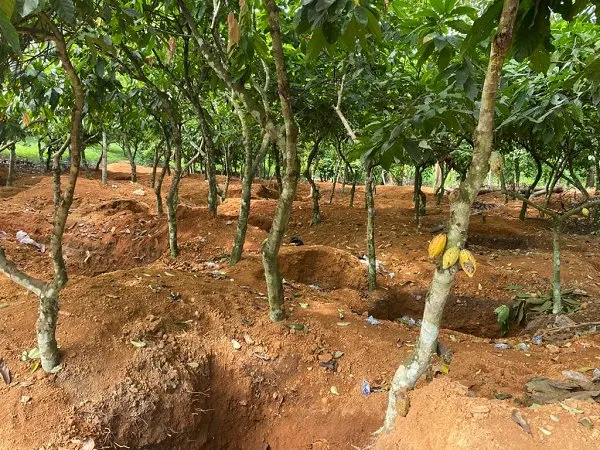Cocoa farmers in Segyimase in the Abuakwa South Municipality and Osino in the Fanteakwa South District of the Eastern Region have attributed the continuous indiscriminate illegal mining activities and forceful takeover of cocoa plantations by illegal miners popularly known as ‘galamseyers’ as a contributory factor to the decline in cocoa production in the country.
Some farmers in an interview with Channel One TV disclosed that poverty and lack of commitment from the government drove them into selling their cocoa plantations to illegal miners.
Eno Lawrencia Akufo lamented how she lost her cocoa plantation after her son sold it out to illegal miners in her absence when she visited the regional capital for a medical check-up.
Opanyin Emmanuel Takyi, an opinion leader and a former assemblyman for Segyimase, explained how activities of illegal mining have affected a total of 18 acres of his cocoa farms at three different locations.
Ghana’s cocoa output for the 2023/24 season is expected to be almost 40% below a target of 820,000 metric tonnes when global cocoa prices hit US$ 10,000 per tonne this year.
In the first four months of 2024, Ghana’s trade balance narrowed after cocoa exports dropped. On a year-on-year comparison, cocoa output fell by about 50%.
The situation is not different from Osino in the Fanteakwa South district, where about 40 to 50 percent of cocoa plantations have been sold out to illegal miners. About 70 percent of cocoa plantations have been lost to mining in Osino.
When the news team decided to visit an area that once had a cocoa plantation just along the main Accra Kumasi Highway to check its state, illegal miners were busily on-site, working.
They had dug deep pits next to ECG poles and transmission lines and left them uncovered just about 10 meters away from the main highway.
In 2022, the leadership of the Ghana National Small Scale Miners Association during a working visit to the same spot demanded the immediate arrest of persons involved in mining close to the main Accra Kumasi Highway.
However, a year on, the situation has moved from bad to worse as the illegal miners have mined the whole area including under electricity poles leaving them hanging.

